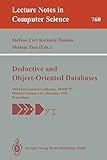Deductive and Object-Oriented Databases [electronic resource] : Third International Conference, DOOD'93 Phoenix, Arizona, USA, December 6–8, 1993 Proceedings / edited by Stefano Ceri, Katsumi Tanaka, Shalom Tsur.
Material type: TextSeries: Lecture Notes in Computer Science ; 760Publisher: Berlin, Heidelberg : Springer Berlin Heidelberg, 1993Description: XII, 496 p. online resourceContent type: text Media type: computer Carrier type: online resourceISBN: 9783540482123Subject(s): Computer science | Database management | Artificial intelligence | Computer Science | Database Management | Programming Techniques | Artificial Intelligence (incl. Robotics) | Mathematical Logic and Formal LanguagesAdditional physical formats: Printed edition:: No titleDDC classification: 005.74 LOC classification: QA76.9.D3Online resources: Click here to access online
TextSeries: Lecture Notes in Computer Science ; 760Publisher: Berlin, Heidelberg : Springer Berlin Heidelberg, 1993Description: XII, 496 p. online resourceContent type: text Media type: computer Carrier type: online resourceISBN: 9783540482123Subject(s): Computer science | Database management | Artificial intelligence | Computer Science | Database Management | Programming Techniques | Artificial Intelligence (incl. Robotics) | Mathematical Logic and Formal LanguagesAdditional physical formats: Printed edition:: No titleDDC classification: 005.74 LOC classification: QA76.9.D3Online resources: Click here to access online  E-BOOKS
E-BOOKS
| Current library | Home library | Call number | Materials specified | URL | Status | Date due | Barcode |
|---|---|---|---|---|---|---|---|
| IMSc Library | IMSc Library | Link to resource | Available | EBK6368 |
Treating programs as objects: The computational proxy experience -- Foundations of aggregation in deductive databases -- The differential fixpoint operator with subsumption -- Datalog with non-deterministic choice computes NDB-PTIME -- A deductive and object-oriented approach to a complex scheduling problem -- On the logical foundations of schema integration and evolution in heterogeneous database systems -- Explaining program execution in deductive systems -- A logic for rule-based query optimization in graph-based data models -- Specifying rule-based query optimizers in a reflective framework -- Semantic query optimization in deductive object-oriented databases -- Research in deductive and object-oriented databases -- An implementation overview of the Aditi deductive database system -- Negation and aggregates in recursive rules: the LDL++ approach -- IsaLog¬: A deductive language with negation for complex-object databases with hierarchies -- On efficient reasoning with implication constraints -- Bottom-up query evaluation with partially ordered defaults -- An extension of path expressions to simplify navigation in object-oriented queries -- Query classes -- Database updating revisited -- Super-key classes for updating materialized derived classes in object bases -- Applications of deductive and object-oriented databases -- Beyond data dictionaries: Towards a reflective architecture of intelligent database systems -- A deductive and typed object-oriented language -- Noodle: A language for declarative querying in an object-oriented database -- Tracking causal dependencies in an active object-oriented database -- Automatic class and method generation for object-oriented databases -- Modeling multilevel entities using single level objects -- A model using classes as a basic organization tool -- Knowledge base revision using circumscription -- Versioning of objects in deductive databases -- A model for sets and multiple inheritance in deductive object-oriented systems.
This volume contains the proceedings of the Third International Conference on Deductive and Object-Oriented Databases. Its central tenet is that the object-oriented and deductive paradigms for modeling, organizing, and processing data complement each other, rather than competing, and that problems involving massive volumes of complex data can best be solved by integrating the best of both approaches. Central questions in the area are: - How do we design a tool that presents the best of the object-oriented and declarative ideas? - How can the users of this tool express their problems in a combination of declarative and procedural features? The volume includes 29 papers that contribute towards answering these questions.


There are no comments on this title.